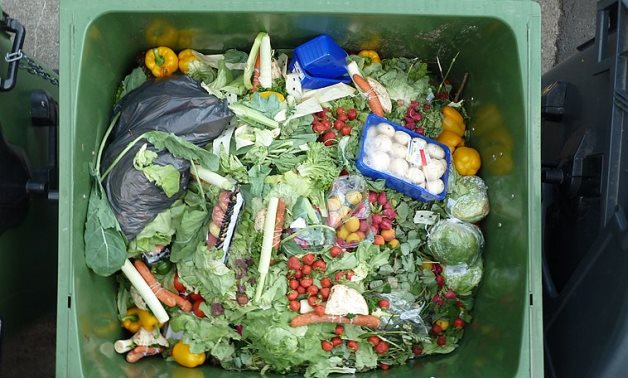
Wasted vegetables and fruits of a hypermarket from one or two days. Some of the more impressing stuff in there was found underneath the surface - like about one carton of bananas.- CC via Wikimedia
CAIRO – 4 May 2022: The Egyptian House of Representatives is considering a new draft law on regulating food waste and encouraging its redistribution, recycling and donation, a step taken to cope with the repercussions of increasing population, limited food production resources, and the ongoing global economic crisis of food chain supply.
The new bill, which was presented by lawmaker Amira Saber along with one-tenth of the house members, aims at prohibiting the waste of edible food for redistribution. The new draft law has been referred to the concerned committees at the parliament for consideration.
The bill provides a number of incentives and imposes fines to encourage foodservice providers of retailers and restaurant owners to donate the food surplus suitable for human consumption. Wasting the eatable food is punishable by a fine ranging from 100,000 EGP (US$ 5,412) to 500,00 EGP (US$ 27,060) as the draft law stipulates, Al-Watan newspaper reported on April 18, 2022.
As per this bill, a national program shall be established by the Egyptian Food Safety Authority and the Ministry of Social Solidarity. It also prohibits the disposal of unsold food at retailers to be donated.
Concerning the food waste unacceptable for human consumption, the law encourages recycling, besides promoting the culture of rationalizing food consumption.
A study prepared by the Food and Agriculture Organization of the United Nations (FAO) showed that about 50 percent of vegetables and fruits, 40 percent of fish, 30 percent of milk and wheat are wasted annually in Egypt, said FAO in a statement on April 28, 2022.
Hence, the FAO and the Egyptian Food Bank, in cooperation with the Unit for Monitoring Loss and Waste in Agricultural Products at the Agricultural Economics Research Institute, launched in early April an awareness campaign titled “30 pieces of advice in 30 days” to reduce the food waste over the holy month of Ramadan, during which Egyptians consume and waste much more food despite their fasting.
During Ramadan, the ninth month of the Islamic Calendar when Muslims worldwide abstain from eating and drinking from dawn to sunset, Egyptians are usually holding major breakfast banquets that include several main dishes, side dishes, and more than two different types of juice, and deserts. So, purchasing more food leads to more waste.
About 15-25 of the food purchased in Ramadan finds its way to trash bins, said EcoMENA on April 7, 2022.
Food waste is the loss that occurs by retailers or consumers due to poor storage, lack of awareness, and consumer behavior during holidays, weddings, family gatherings, and in restaurants and hotels, where large amounts of food waste are being produced, according to a report issued by the Agricultural Research Center in September 2021.
The Cairo-based Regional Food Banks Network Moez Shohdy, for instance, stated on April 16, 2022 that the organization helped save 58 million cooked meals - produced by hotels – from getting wasted monthly.
The draft law is being mulled amid a crisis of global food chain supply due to the ongoing conflict between Russia and Ukraine, the largest grain exporters in the world. The global crisis has negatively affected Egypt, the largest wheat importer worldwide.
“FAS Cairo forecasts Egypt’s wheat imports in MY 2022/23 (July – June) at 11 MMT, down by 8.3 percent from MY 2021/22 Post’s import estimate figure of 12 MMT. Importing and buying wheat from other markets remains a viable option for government and private purchases,” the US Foreign Agriculture Service (FAS) of the US Department of Agriculture on March 28, 2022.
In Egypt, the food waste per capita reached 91 kilograms in 2021, in comparison to 73kg, 60 Kg and 50 kg in 2020, 2019, and 2018, respectively, according El Dostor newspaper depending on FAO data. The more people increase, the more waste per capita will be.
In the year 2020, food waste per capita jumped to 73 kilograms per year, and the annual per capita waste continued to jump during the year 2021, reaching 91 kilograms per capita, and that year food waste in Egypt amounted to a total of 9,136,941 tons of food. Egypt's population reached 103 million people on February 22, 2022, domestically, by an increased rate of a child born every 20 seconds, said the state-owned Central Agency for Public Mobilization and Statistics (CAPMAS).
Comments
Leave a Comment